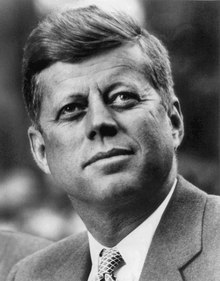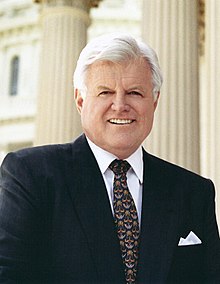 |
The Kennedy trio in the mid 30s as teenagers John, Bobby and Teddy
|
| John F. Kennedy | |
|---|---|
 | |
| 35th President of the United States | |
| In office January 20, 1961 – November 22, 1963 | |
| Vice President | Lyndon B. Johnson |
| Preceded by | Dwight D. Eisenhower |
| Succeeded by | Lyndon B. Johnson |
| United States Senator from Massachusetts | |
| In office January 3, 1953 – December 22, 1960 | |
| Preceded by | Henry Cabot Lodge Jr. |
| Succeeded by | Benjamin A. Smith II |
| Member of the U.S. House of Representatives from Massachusetts's 11th district | |
| In office January 3, 1947 – January 3, 1953 | |
| Preceded by | James Michael Curley |
| Succeeded by | Tip O'Neill |
| Personal details | |
| Born | John Fitzgerald Kennedy May 29, 1917 Brookline, Massachusetts, U.S. |
| Died | November 22, 1963 (aged 46) Dallas, Texas, U.S. |
| Cause of death | Assassinated |
| Resting place | Arlington National Cemetery |
| Political party | Democratic |
| Spouse(s) | Jacqueline Bouvier (m. 1953) |
| Relations | See Kennedy family |
| Children | 4, including a stillborn daughter informally named Arabella, Caroline Kennedy,John F. Kennedy Jr., andPatrick Bouvier Kennedy |
| Parents | Joseph P. Kennedy, Sr. Rose Fitzgerald Kennedy |
| Alma mater | Harvard University |
| Profession | Politician |
| Religion | Roman Catholicism |
| Signature | |
John Fitzgerald "Jack" Kennedy (May 29, 1917 – November 22, 1963), commonly referred to by his initials JFK, was an American politician who served as the 35th President of the United States from January 1961 until his assassination in November 1963. The Cuban Missile Crisis, The Bay of Pigs Invasion, the Nuclear Test Ban Treaty, the establishment of the Peace Corps, developments in the Space Race, the building of the Berlin Wall, the Trade Expansion Act to lower tariffs, and the Civil Rights Movement all took place during his presidency. A member of theDemocratic Party, his New Frontier domestic program was largely enacted as a memorial to him after his death.
Kennedy's time in office was marked by high tensions with Communist states. Kennedy increased the number of American military advisers in South Vietnam by a factor of 18 over Eisenhower. In Cuba, a failed attempt was made at the Bay of Pigs to overthrow the country's dictator Fidel Castro in April 1961. Kennedy's administration subsequently rejected plans by the Joint Chiefs of Staff to orchestrate false-flag attacks on American soil in order to gain public approval for a war against Cuba. In October 1962, it was discovered Soviet ballistic missiles had been deployed in Cuba; the resulting period of unease, termed the Cuban Missile Crisis, is seen by many historians as the closest the human race has ever come to nuclear war between nuclear armed belligerents.
| Ted Kennedy | |
|---|---|

Ted Kennedy, June 2009
| |
| United States Senator from Massachusetts | |
| In office November 7, 1962 – August 25, 2009 | |
| Preceded by | Benjamin A. Smith II |
| Succeeded by | Paul G. Kirk |
| Chairman of the Senate Committee on Health, Education, Labor, and Pensions | |
| In office January 4, 2007 – August 25, 2009 | |
| Preceded by | Mike Enzi |
| Succeeded by | Tom Harkin |
| In office June 6, 2001 – January 3, 2003 | |
| Preceded by | Jim Jeffords |
| Succeeded by | Judd Gregg |
| In office January 3, 2001 – January 20, 2001 | |
| Preceded by | Jim Jeffords |
| Succeeded by | Jim Jeffords |
| Chairman of the Senate Committee on Labor and Human Resources | |
| In office January 3, 1987 – January 3, 1995 | |
| Preceded by | Orrin Hatch |
| Succeeded by | Nancy Kassebaum |
| Chairman of the Senate Committee on the Judiciary | |
| In office January 3, 1979 – January 3, 1981 | |
| Preceded by | James Eastland |
| Succeeded by | Strom Thurmond |
| Senate Majority Whip | |
| In office January 3, 1969 – January 3, 1971 | |
| Leader | Mike Mansfield |
| Preceded by | Russell B. Long |
| Succeeded by | Robert Byrd |
| Personal details | |
| Born | Edward Moore Kennedy February 22, 1932 Boston, Massachusetts, U.S. |
| Died | August 25, 2009 (aged 77) Hyannis Port, Massachusetts, U.S. |
| Resting place | Arlington National Cemetery Arlington County, Virginia, U.S. Section 45, Grave S-45-B 38.88094°N 77.07140°W |
| Political party | Democratic |
| Spouse(s) |
|
| Relations | See Kennedy family |
| Children | Kara Kennedy Edward M. Kennedy, Jr. Patrick J. Kennedy |
| Parents | |
| Alma mater | Harvard University (A.B.) University of Virginia (J.D.) |
| Profession | Lawyer Politician |
| Religion | Roman Catholicism |
| Signature |  |
| Website | tedkennedy.org |
Edward Moore "Ted" Kennedy (February 22, 1932 – August 25, 2009) was a United States Senator fromMassachusetts and a member of the Democratic Party. He was the second most senior member of the Senate when he died and was the fourth-longest-serving senator in United States history, having served there for almost 47 years. The most prominent living member of the Kennedy family for many years, he was the last surviving son of Joseph P. Kennedy, Sr. and Rose Kennedy; the youngest brother of President John F. Kennedy and Senator Robert F. Kennedy, both victims of assassination; and the father of Congressman Patrick J. Kennedy.
Kennedy entered the Senate in a November 1962 special election to fill the seat once held by his brother John. He was elected to a full six-year term in 1964 and was reelected seven more times. The Chappaquiddick incident on July 18, 1969, resulted in the death of his automobile passenger, Mary Jo Kopechne. Kennedy pleaded guilty to a charge of leaving the scene of an accident; the incident and its aftermath hindered his chances of ever becoming President of the United States. His one attempt, in the 1980 presidential election, resulted in a Democratic primary campaign loss to incumbent President Jimmy Carter.
| Robert F. Kennedy | |
|---|---|

Kennedy appearing before the Platform Committee, 1964
| |
| United States Senator from New York | |
| In office January 3, 1965 – June 6, 1968 | |
| Preceded by | Kenneth Keating |
| Succeeded by | Charles Goodell |
| 64th United States Attorney General | |
| In office January 20, 1961 – September 3, 1964 | |
| President | John F. Kennedy (1961–63) Lyndon B. Johnson (1963–64) |
| Preceded by | William P. Rogers |
| Succeeded by | Nicholas Katzenbach |
| Personal details | |
| Born | Robert Francis Kennedy November 20, 1925 Brookline, Massachusetts, U.S. |
| Died | June 6, 1968 (aged 42) Los Angeles, California, U.S. |
| Resting place | Arlington National Cemetery Arlington County, Virginia, U.S. 38.88118°N 77.07150°W |
| Political party | Democratic |
| Spouse(s) | Ethel Skakel (m. 1950–68) (his death) |
| Relations | See: Kennedy family |
| Children | Kathleen, Joseph, Robert Jr.,David, Courtney, Michael,Kerry, Christopher, Max,Douglas, Rory |
| Alma mater | Harvard University University of Virginia School of Law |
| Profession | Lawyer Politician |
| Religion | Roman Catholic |
| Signature | |
Robert Francis "Bobby" Kennedy (November 20, 1925 – June 6, 1968), commonly known by his initials RFK, was an American politician from Massachusetts. He served as a senator for New York from 1965 until his assassination in 1968. He was previously the 64th U.S. Attorney General from 1961 to 1964, serving under his older brother, PresidentJohn F. Kennedy and his successor, President Lyndon B. Johnson. An icon of modern American liberalism, and a member of the Democratic Party, Kennedy ran for its presidential nomination in the 1968 election.
After serving in the United States Naval Reserve as a Seaman Apprentice from 1944 to 1946, Kennedy graduated fromHarvard College and the University of Virginia School of Law. Prior to entering public office, he worked as a correspondent for the Boston Post and as an assistant counsel to the Senate committee chaired by Joe McCarthy. He gained national attention as the chief counsel of the Senate Labor Rackets Committee from 1957 to 1959, where he publicly challenged Teamsters President Jimmy Hoffa over the corrupt practices of its union and authored The Enemy Within, a book about corruption in organized labor.
Kennedy was the campaign manager for his brother John in the 1960 presidential election. He was appointed Attorney General after the successful election and served as the closest adviser to the president from 1961 to 1963. His tenure is best known for its advocacy for the Civil Rights Movement, the crusade against organized crime and the Mafia, and involvement in U.S. foreign policy related to Cuba. After his brother's assassination, he remained in office in the Johnson administration for a few months. He left to run for the United States Senate in New York in 1964 defeatingRepublican incumbent Kenneth Keating.
In 1968, Kennedy was a leading candidate for the Democratic nomination for the presidency, appealing especially topoor, African-American, Hispanic, and Catholic voters. Shortly after midnight on June 5, 1968, after defeating SenatorEugene McCarthy in the California presidential primary, he was shot by Sirhan Sirhan, a 24-year-old Palestinian, and died the following day.

No comments:
Post a Comment